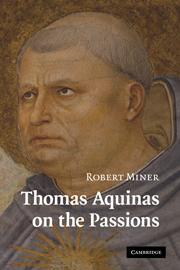Book contents
- Frontmatter
- Contents
- List of figures
- List of tables
- Acknowledgments
- A note on the texts
- Introduction
- Part 1 THE PASSIONS IN GENERAL
- Part 2 PARTICULAR PASSIONS: THE CONCUPISCIBLE PASSIONS
- Part 3 PARTICULAR PASSIONS: THE IRASCIBLE PASSIONS
- 9 Hope and despair
- 10 Fear
- 11 Daring
- 12 Anger
- Epilogue: The passions, the virtues, and happiness
- Bibliography
- Index
12 - Anger
Published online by Cambridge University Press: 06 July 2009
- Frontmatter
- Contents
- List of figures
- List of tables
- Acknowledgments
- A note on the texts
- Introduction
- Part 1 THE PASSIONS IN GENERAL
- Part 2 PARTICULAR PASSIONS: THE CONCUPISCIBLE PASSIONS
- Part 3 PARTICULAR PASSIONS: THE IRASCIBLE PASSIONS
- 9 Hope and despair
- 10 Fear
- 11 Daring
- 12 Anger
- Epilogue: The passions, the virtues, and happiness
- Bibliography
- Index
Summary
Aquinas begins the consideration of anger by asking what makes it a passion. Understanding the precise nature of anger as a passion is crucial, lest it be confused with the sin that bears the same name. Aquinas asks why anger is a specific passion, rather than the general act of the irascible (as its name might suggest), and isolates the formal object of anger (§12.1). In the course of treating anger itself, Aquinas positively connects anger to reason, nature, and justice. Though anger may distort our perception of what is required by each of these things, its primal connection to these things is divinely intended and, as such, good. Or so Aquinas holds in what, I argue, amounts to a qualified defense of the passion of anger (§12.2). What causes anger? Aquinas addresses this question by identifying and explaining the efficient and dispositive causes of anger: an act of slight or contempt directed against a person, the superiority of the person who is angered, a lack or defect on the part of the person who does the slighting (§12.3). As for anger's effects, Aquinas (perhaps surprisingly) holds that pleasure is necessarily a consequence of anger. Imagining vindication generates some pleasure; achieving vindication produces even more. Other effects include fervor, the impairment of reason, and taciturnity. While attentive to the negative and destructive effects of immoderate anger, Aquinas emphasizes that anger, like the other passions, is part of human nature and has an appropriate role to play in the human pursuit of good when directed by reason. That Aquinas takes this view of the matter is confirmed by examining the treatment of Christ's anger in the 3a pars (§12.4).
- Type
- Chapter
- Information
- Thomas Aquinas on the PassionsA Study of Summa Theologiae, 1a2ae 22–48, pp. 268 - 286Publisher: Cambridge University PressPrint publication year: 2009
- 1
- Cited by



